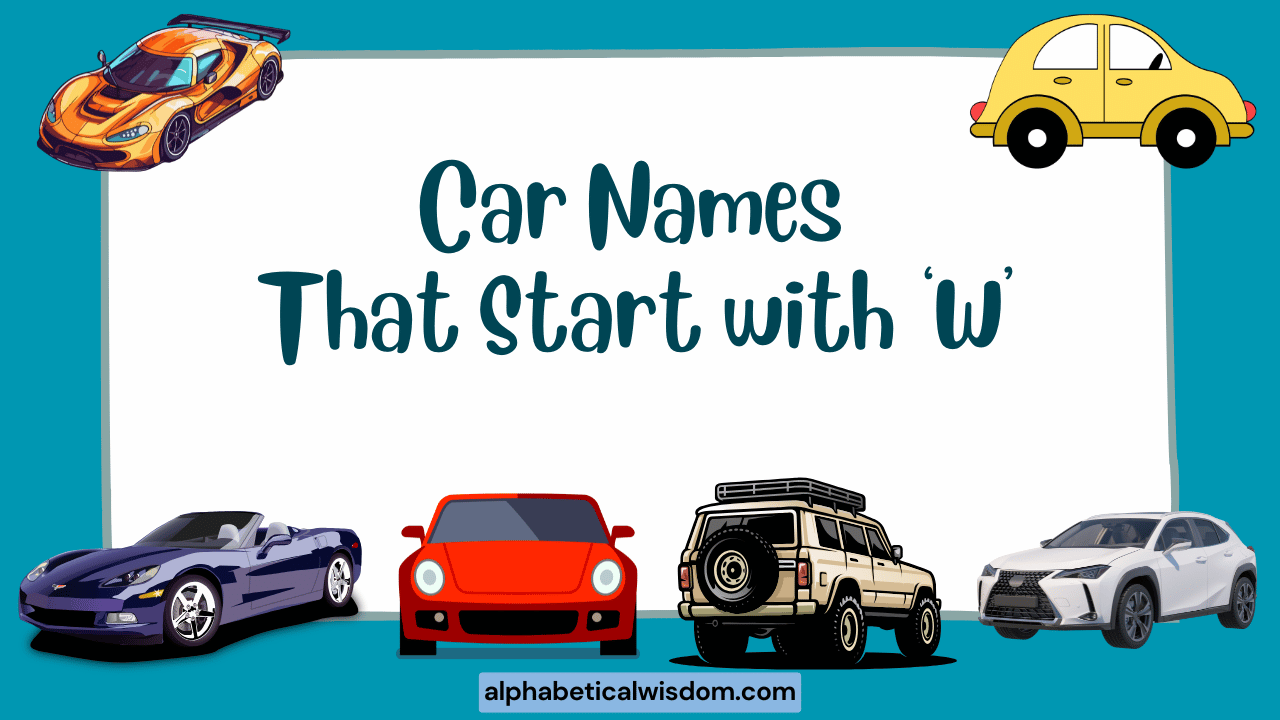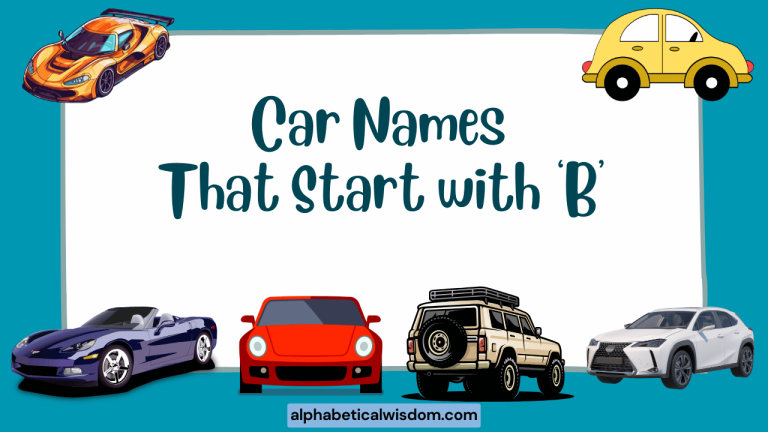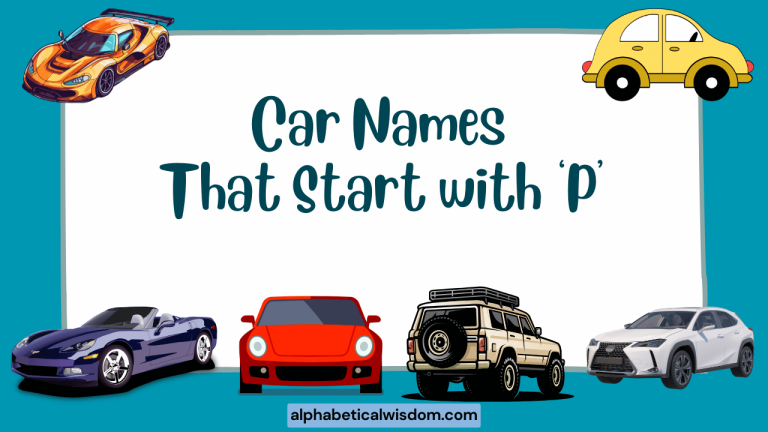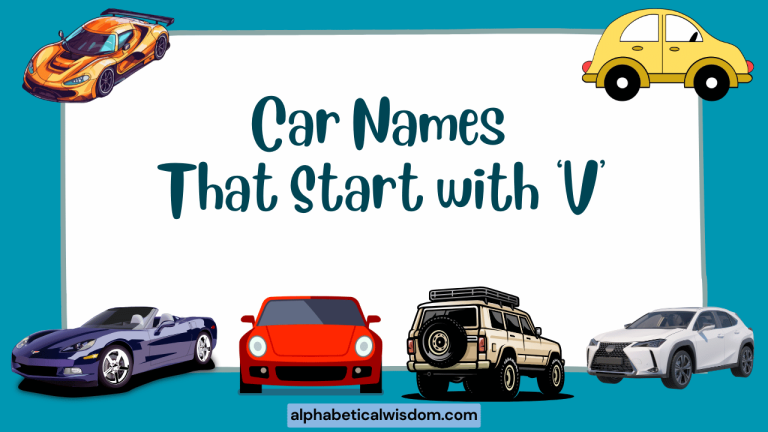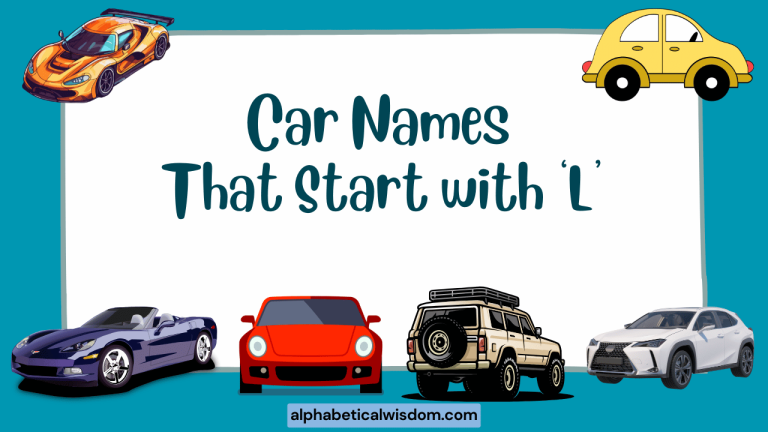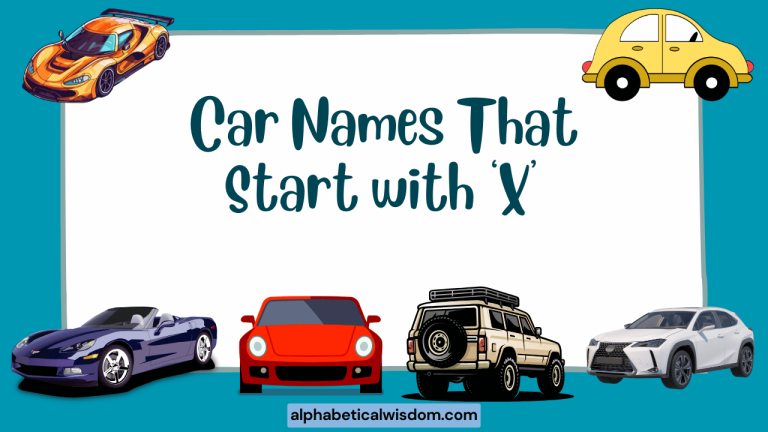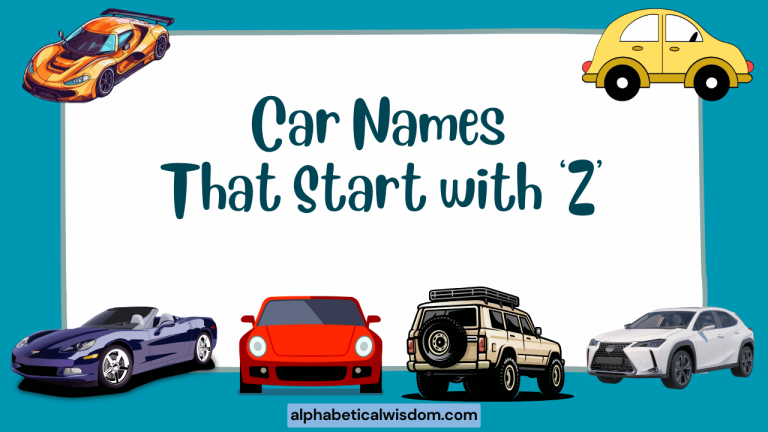Car Names That Start With ‘W’: A Grammatical Exploration
Understanding the grammatical function of car names, particularly those beginning with the letter ‘W,’ offers a unique lens through which to examine English grammar. Car names, like all proper nouns, follow specific grammatical rules and conventions.
This article explores these rules, providing a comprehensive guide for English language learners and enthusiasts alike. By analyzing the structure, usage, and common errors associated with ‘W’ car names, readers will gain a deeper appreciation for the nuances of English grammar and its practical applications in everyday language.
This guide is beneficial for anyone interested in linguistics, marketing, or simply improving their grasp of English grammar. Whether you are a student, a writer, or an automotive aficionado, this article will equip you with the knowledge and skills to confidently navigate the world of car names and their grammatical intricacies.
Table of Contents
- Definition of Car Names and Noun Types
- Structural Breakdown of Car Names
- Types and Categories of Car Names Starting with ‘W’
- Examples of Car Names Starting with ‘W’
- Usage Rules for Car Names
- Common Mistakes with Car Names
- Practice Exercises
- Advanced Topics
- FAQ
- Conclusion
Definition of Car Names and Noun Types
Car names are proper nouns used to identify specific models of automobiles. Proper nouns, unlike common nouns, always begin with a capital letter and refer to a unique entity, whether it’s a person, place, or thing.
In the context of grammar, car names function similarly to other proper nouns, adhering to specific rules regarding capitalization, pluralization, and use in sentences.
Car names can be classified based on their origin, style, and the intended image they convey. Some names are derived from historical figures, geographical locations, or technological innovations.
Others are designed to evoke feelings of luxury, power, or adventure. Understanding these classifications helps to appreciate the diverse range of car names and their grammatical implications.
Noun Types and Car Names
Nouns are words that represent people, places, things, or ideas. They are a fundamental part of speech in English grammar.
There are several types of nouns, each with its own characteristics and rules. Understanding these types is crucial for correctly using car names in sentences.
- Proper Nouns: These are specific names of people, places, or things. Car names fall into this category. Examples include Wrangler, Wraith, and Windstar. They are always capitalized.
- Common Nouns: These refer to general categories rather than specific entities. Examples include car, truck, and vehicle.
- Concrete Nouns: These refer to tangible things that can be perceived through the senses. Cars themselves are concrete nouns.
- Abstract Nouns: These refer to intangible concepts, ideas, or qualities. Examples include speed, luxury, and reliability.
Structural Breakdown of Car Names
The structure of car names can vary significantly, ranging from single words to compound terms. Some car names are simple and straightforward, while others are more complex and evocative.
Analyzing the structural elements of car names helps to understand their meaning and grammatical function.
Many car names are single words, such as Wrangler or Windsor. These names often have historical or symbolic significance, reflecting the brand’s heritage or the vehicle’s intended purpose. Other car names are compound words, such as Windstar, combining two or more words to create a new meaning. These compound names can be more descriptive and informative, providing clues about the vehicle’s features or characteristics.
Morphological Analysis of Car Names
Morphology is the study of word structure. Analyzing the morphology of car names can reveal their origins and meanings. Many car names are derived from existing words, either through modification or combination. For example, Wrangler suggests someone who handles or manages something, fitting for a rugged off-road vehicle. Windstar combines “wind” and “star,” evoking a sense of freedom and adventure. Understanding the morphological components of car names can enhance their meaning and impact.
Types and Categories of Car Names Starting with ‘W’
Car names starting with ‘W’ can be categorized based on various criteria, including their origin, style, and the image they convey. These categories help to understand the diverse range of car names and their intended audience.
Origin-Based Categories
- Geographical Names: Some car names are derived from geographical locations, such as cities, regions, or landmarks. For example, Windsor is named after the town of Windsor in England.
- Historical Names: Other car names are inspired by historical figures, events, or periods. These names often evoke a sense of tradition and heritage.
- Descriptive Names: These names describe the vehicle’s characteristics, features, or intended use. For example, Wrangler suggests a vehicle designed for off-road adventures.
Style-Based Categories
- Luxury Names: These names are designed to evoke feelings of elegance, sophistication, and exclusivity. They often use refined language and imagery.
- Sporty Names: These names convey a sense of speed, agility, and excitement. They often use dynamic and energetic language.
- Practical Names: These names emphasize the vehicle’s functionality, reliability, and affordability. They often use straightforward and descriptive language.
Examples of Car Names Starting with ‘W’
This section provides numerous examples of car names starting with ‘W,’ categorized for clarity. Each table includes a variety of names, showcasing the diversity and creativity in automotive branding.
The following table presents car names starting with ‘W’ that suggest strength, power, or capability, often associated with trucks or SUVs.
| Car Name | Description |
|---|---|
| Wrangler | Jeep’s iconic off-road vehicle, known for its ruggedness and capability. |
| Warrior | A name suggesting strength and combat readiness, sometimes used for truck trims. |
| Workhorse | Implies a vehicle built for heavy-duty tasks and reliability. |
| Wildcat | Evokes a sense of untamed power and agility. |
| Wanderer | Suggests a vehicle suited for exploration and adventure. |
| Whippet | Although a small dog breed, the name suggests speed and agility, sometimes used historically. |
| Wyvern | A mythical creature, symbolizing power and strength. |
| Wolverine | A fierce and tenacious animal, suggesting resilience and toughness. |
| Woodsman | Implies a vehicle suited for outdoor work and rugged terrain. |
| Wayfarer | Suggests a vehicle designed for long journeys and exploration. |
| Wildtrak | Ford Ranger trim suggesting off-road capability and adventure. |
| Windjammer | Evokes images of sailing ships, suggesting freedom and exploration. |
| Wolfsburg Edition | A special edition, often associated with Volkswagen, named after the city Wolfsburg. |
| Whisper | Ironically suggests quiet power, perhaps for electric vehicles. |
| Whirlwind | Implies high speed and dynamic performance. |
| White Star | Evokes luxury and prestige, reminiscent of classic automotive eras. |
| Wingfoot | Associated with Goodyear tires, suggesting speed and reliability. |
| Western Star | A brand of heavy-duty trucks, emphasizing durability and power. |
| Woodie | Refers to cars with wooden panels, suggesting classic style and craftsmanship. |
| Winton | An early American automobile manufacturer, representing automotive history. |
| Whiptail | Suggests speed and agility, often associated with sports cars. |
| Windrunner | Implies speed and efficiency, possibly used for aerodynamic vehicles. |
| World Rally Car | Specific type of rally car, emphasizing performance and competition. |
| Wasp | Suggests speed and a sting, suitable for a sporty car. |
The following table lists car names starting with ‘W’ that evoke a sense of luxury, comfort, or prestige, often found in sedans or high-end vehicles.
| Car Name | Description |
|---|---|
| Wraith | Rolls-Royce’s elegant and powerful grand tourer. |
| Windsor | A classic name suggesting sophistication and luxury, used by various manufacturers. |
| Westminster | Evokes images of British aristocracy and refined taste. |
| White Diamond | Suggests exceptional luxury and rarity, often used for special editions. |
| Woodstock | Though associated with the music festival, it can evoke a sense of classic style. |
| Wanderlust | Suggests a desire for travel and adventure in luxury. |
| Waldorf | Evokes images of high-end hotels and luxury experiences. |
| White House | Suggests prestige and importance, though rarely used due to political connotations. |
| World Class | Implies top-tier quality and performance. |
| Winterlude | Suggests a luxurious and comfortable winter driving experience. |
| Willow | Evokes a sense of grace and elegance, suitable for a luxury sedan. |
| Watermark | Suggests exclusivity and a unique identity. |
| Wellington | Evokes a sense of British heritage and sophistication. |
| Whisper Quiet | Implies a smooth and serene driving experience. |
| West End | Evokes images of London’s theater district, suggesting sophistication. |
| White Gold | Suggests exceptional luxury and value. |
| Wind Chime | Evokes tranquility and harmony, suitable for a comfortable ride. |
| Woven | Suggests craftsmanship and attention to detail. |
| Water Lily | Evokes elegance and natural beauty. |
| White Orchid | Suggests rarity and exotic beauty. |
| Wise | Implies intelligence and thoughtful design. |
| Wonder | Evokes amazement and delight, suitable for a technologically advanced car. |
| Wayfarer Edition | Suggests luxury travel and exploration. |
| Windsor Knot | Evokes elegance and classic style, reminiscent of British tailoring. |
This table includes car names beginning with ‘W’ that emphasize practicality, family use, or fuel efficiency, often associated with minivans or sedans.
| Car Name | Description |
|---|---|
| Windstar | Ford’s minivan, designed for family comfort and practicality. |
| Wagon | A general term for a station wagon, emphasizing cargo space and versatility. |
| Weekender | Suggests a vehicle suitable for family trips and weekend getaways. |
| Wise Choice | Implies a sensible and practical vehicle purchase. |
| World Car | Suggests a globally recognized and reliable vehicle. |
| Workmate | Implies a reliable and practical vehicle for everyday tasks. |
| Way to Go | A catchy name suggesting efficiency and ease of use. |
| Worthy | Implies reliability and value for money. |
| Wellspring | Suggests a source of innovation and practicality. |
| Weekday | Implies a vehicle suitable for daily commutes and errands. |
| Wheelbase | Refers to the distance between the front and rear axles, important for handling and space. |
| Widebody | Refers to a car with a wider track, enhancing stability and appearance. |
| Winter Beater | A colloquial term for an inexpensive car used during harsh winter conditions. |
| World Traveler | Suggests a reliable and comfortable vehicle for long journeys. |
| Wind Tunnel | Refers to aerodynamic testing, implying efficiency and performance. |
| Warrant | Implies reliability and a guarantee of quality. |
| We Care | A name emphasizing safety and family-friendly features. |
| Well-Rounded | Suggests a vehicle with a balanced set of features and capabilities. |
| Wholesome | Implies a safe and family-oriented vehicle. |
| Why Not | A playful name suggesting affordability and practicality. |
| Winning Edge | Suggests a vehicle with competitive advantages in fuel efficiency or features. |
| Work Smart | Implies a vehicle designed for efficient and productive use. |
| Worth It | Suggests a vehicle with great value for its price. |
| Wrap Star | A car with customizable wraps for individual expression. |
Usage Rules for Car Names
Car names, as proper nouns, follow specific usage rules in English grammar. These rules govern capitalization, article usage, and pluralization.
Adhering to these rules ensures clarity and correctness in writing and speech.
Capitalization Rules
The most important rule for car names is that they must always be capitalized. This distinguishes them from common nouns and indicates that they refer to a specific model or brand. For example, Wrangler is capitalized because it is the name of a specific Jeep model. However, the word “car” is not capitalized because it is a common noun.
Article Usage (A, An, The)
The use of articles (a, an, the) with car names depends on the context. Generally, when referring to a specific car, the definite article “the” is used. When referring to a car in general, the indefinite articles “a” or “an” may be used, depending on the sound of the following word.
- Specific Car: The Wrangler I saw yesterday was red.
- General Car: I want a Wrangler someday.
Pluralization Rules
Car names can be pluralized when referring to multiple vehicles of the same model. The plural form is usually created by adding “s” to the end of the name.
However, there are exceptions and special cases to consider.
- Regular Plural: We saw three Wranglers at the dealership.
- Irregular Plural: Some car names may have irregular plural forms, although this is rare.
Common Mistakes with Car Names
Even experienced English speakers can make mistakes when using car names. This section addresses some of the most common errors and provides correct examples.
Incorrect Capitalization
One of the most frequent mistakes is failing to capitalize car names. Remember that all car names are proper nouns and must be capitalized.
| Incorrect | Correct |
|---|---|
| I want a wrangler. | I want a Wrangler. |
Incorrect Article Usage
Using the wrong article (or no article at all) can also lead to errors. Pay attention to whether you are referring to a specific car or a car in general.
| Incorrect | Correct |
|---|---|
| The Wrangler is good car. | The Wrangler is a good car. |
Incorrect Pluralization
While most car names are pluralized by adding “s,” it’s important to be aware of any potential irregular forms (though rare for car names).
| Incorrect | Correct |
|---|---|
| We saw many Wrangler. | We saw many Wranglers. |
Practice Exercises
Test your knowledge with these practice exercises. Fill in the blanks with the correct form of the car name or article.
Exercise 1: Capitalization
Instructions: Capitalize the car names in the following sentences.
- I saw a ford windstar yesterday.
- My friend drives a jeep wrangler.
- The rolls-royce wraith is a luxury car.
- He wants to buy a volkswagen wolfsburg edition.
- She prefers the western star trucks.
Answer Key:
- I saw a Ford Windstar yesterday.
- My friend drives a Jeep Wrangler.
- The Rolls-Royce Wraith is a luxury car.
- He wants to buy a Volkswagen Wolfsburg Edition.
- She prefers the Western Star trucks.
Exercise 2: Article Usage
Instructions: Fill in the blanks with the correct article (a, an, the) or leave it blank if no article is needed.
- I want to buy ____ Wrangler someday.
- ____ Wraith is known for its luxury.
- She drives ____ Windstar to work every day.
- He saw ____ Western Star truck on the highway.
- Is ____ Wolfsburg Edition a reliable car?
Answer Key:
- I want to buy a Wrangler someday.
- The Wraith is known for its luxury.
- She drives a Windstar to work every day.
- He saw a Western Star truck on the highway.
- Is the Wolfsburg Edition a reliable car?
Exercise 3: Pluralization
Instructions: Pluralize the car names in the following sentences where appropriate.
- We saw several Jeep Wrangler at the dealership.
- The Rolls-Royce Wraith are very expensive.
- There are many Ford Windstar on the road.
- He owns two Western Star truck.
- Volkswagen Wolfsburg Edition are popular in Europe.
Answer Key:
- We saw several Jeep Wranglers at the dealership.
- The Rolls-Royce Wraiths are very expensive.
- There are many Ford Windstars on the road.
- He owns two Western Star trucks.
- Volkswagen Wolfsburg Editions are popular in Europe.
Advanced Topics
For advanced learners, this section explores more complex aspects of car name grammar, including historical influences and marketing strategies.
Historical Influences on Car Names
The history of car names reflects broader cultural and technological trends. Early car names often drew inspiration from classical mythology, historical figures, or geographical locations.
As the automotive industry evolved, car names became more focused on performance, luxury, and innovation. Understanding these historical influences provides valuable context for analyzing car name grammar.
Marketing Strategies and Car Names
Car names are a crucial part of automotive marketing. Companies carefully select names that resonate with their target audience and convey the desired image. Linguistic analysis of car names can reveal the marketing strategies behind them. For example, a name like Wanderer might appeal to adventurous consumers, while a name like Windsor might target those seeking luxury and sophistication. The phonetic properties of a name, its length, and its cultural associations all play a role in its effectiveness.
FAQ
This section addresses frequently asked questions about car names and their grammatical properties.
- Why are car names always capitalized?
Car names are capitalized because they are proper nouns, referring to specific models or brands of automobiles. This capitalization distinguishes them from common nouns and indicates their unique identity.
- Do I always need to use an article (a, an, the) before a car name?
The use of articles depends on the context. Use “the” when referring to a specific car (e.g., “The Wrangler I saw was blue”). Use “a” or “an” when referring to a car in general (e.g., “I want a Wrangler”). Sometimes, no article is needed when the car name is used as an adjective (e.g., “Wrangler tires are durable”).
- How do I pluralize car names?
Most car names are pluralized by adding “s” to the end (e.g., “Wranglers”). However, be aware of any potential irregular forms, though these are rare.
- Are there any car names that are also common nouns?
Yes, some car names may also be common nouns. For example, “Wagon” can refer to a type of car, but it can also be a car name. In such cases, capitalization is crucial to distinguish between the proper noun (car name) and the common noun (type of car).
- Can a car name be a verb or an adjective?
While rare, car names can sometimes be used as verbs or adjectives in informal contexts. For example, “I’m going to ‘Wrangler’ my way through this trail” (verb). “That’s a very ‘Wraith-like’ interior” (adjective). However, such usage is generally informal and should be avoided in formal writing.
- What is the difference between a car name and a car brand?
A car brand (e.g., Ford, Jeep, Rolls-Royce) is the manufacturer of the vehicle. A car name (e.g., Windstar, Wrangler, Wraith) is the specific model of the vehicle produced by that manufacturer.
- Why do some car names sound so unusual or evocative?
Car names are often chosen to evoke specific emotions, associations, or qualities. Marketing teams carefully select names that resonate with their target audience and convey the desired image of the vehicle.
- Are there any rules about using trademarks or registered symbols with car names?
Yes, car manufacturers often use trademarks (™) or registered symbols (®) with their car names to protect their brand identity. When writing about car names, it’s important to respect these trademarks and use the symbols appropriately, especially in commercial contexts.
- How do foreign car names affect English grammar usage?
Foreign car names are treated as proper nouns in English and follow the same capitalization rules. However, their pronunciation and spelling may differ from typical English words, which can sometimes cause confusion. Always refer to the correct spelling and pronunciation of foreign car names.
- Do car names influence consumer perception and sales?
Absolutely. A well-chosen car name can significantly influence consumer perception and sales. A name that evokes positive emotions, associations, or qualities can make a vehicle more appealing to potential buyers. Conversely, a poorly chosen name can damage a vehicle’s image and reduce sales.
Conclusion
Understanding the grammatical function of car names, particularly those starting with the letter ‘W,’ provides valuable insights into English grammar and its practical applications. Car names, as proper nouns, follow specific rules regarding capitalization, article usage, and pluralization.
By mastering these rules, you can enhance your writing and speaking skills and communicate more effectively about automobiles.
Remember to always capitalize car names, use articles appropriately, and pluralize correctly. Pay attention to common mistakes and practice regularly to reinforce your knowledge.
Continue to explore the diverse world of car names and their linguistic properties to deepen your appreciation for the nuances of English grammar.
